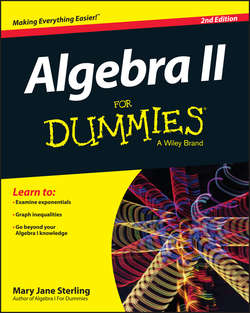Algebra II For Dummies

Реклама. ООО «ЛитРес», ИНН: 7719571260.
Оглавление
Sterling Mary Jane. Algebra II For Dummies
Introduction
About This Book
Foolish Assumptions
Icons Used in This Book
Beyond the Book
Where to Go from Here
Part I. Homing in on Basic Solutions
Chapter 1. Going Beyond Beginning Algebra
Outlining Algebraic Properties
Ordering Your Operations
Zeroing in on the Multiplication Property of Zero
Expounding on Exponential Rules
Implementing Factoring Techniques
Chapter 2. Toeing the Straight Line: Linear Equations
Linear Equations: Handling the First Degree
Linear Inequalities: Algebraic Relationship Therapy
Absolute Value: Keeping Everything in Line
Chapter 3. Conquering Quadratic Equations
Implementing the Square Root Rule
Dismantling Quadratic Equations into Factors
Resorting to the Quadratic Formula
Completing the Square: Warming Up for Conics
Tackling Higher-Powered Polynomials
Solving Quadratic Inequalities
Chapter 4. Rooting Out the Rational, Radical, and Negative
Acting Rationally with Fraction-Filled Equations
Ridding Yourself of a Radical
Changing Negative Attitudes about Exponents
Fooling Around with Fractional Exponents
Chapter 5. Graphing Your Way to the Good Life
Coordinating Your Graphing Efforts
Streamlining the Graphing Process with Intercepts and Symmetry
Graphing Lines
Looking at 10 Basic Forms
Solving Problems with a Graphing Calculator
Part II. Facing Off with Functions
Chapter 6. Formulating Function Facts
Defining Functions
Homing In on Domain and Range
Betting on Even or Odd Functions
Facing One-to-One Confrontations
Going to Pieces with Piecewise Functions
Composing Yourself and Functions
Singing Along with Inverse Functions
Chapter 7. Sketching and Interpreting Quadratic Functions
Interpreting the Standard Form of Quadratics
Investigating Intercepts in Quadratics
Going to the Extreme: Finding the Vertex
Lining Up along the Axis of Symmetry
Sketching a Graph from the Available Information
Applying Quadratics to the Real World
Chapter 8. Staying Ahead of the Curves: Polynomials
Taking a Look at the Standard Polynomial Form
Exploring Polynomial Intercepts and Turning Points
Determining Positive and Negative Intervals
Finding the Roots of a Polynomial
Synthesizing Root Findings
Chapter 9. Reasoning with Rational Functions
Exploring Rational Functions
Adding Asymptotes to the Rational Pot
Accounting for Removable Discontinuities
Pushing the Limits of Rational Functions
Putting It All Together: Sketching Rational Graphs from Clues
Chapter 10. Exposing Exponential and Logarithmic Functions
Evaluating Exponential Expressions
Exponential Functions: It’s All About the Base, Baby
Solving Exponential Equations
Showing an “Interest” in Exponential Functions
Logging On to Logarithmic Functions
Solving Logarithmic Equations
Graphing Exponential and Logarithmic Functions
Part III. Conquering Conics and Systems of Equations
Chapter 11. Cutting Up Conic Sections
Cutting Up a Cone
Opening Every Which Way with Parabolas
Going Round and Round in Conic Circles
Preparing Your Eyes for Solar Ellipses
Feeling Hyper about Hyperbolas
Identifying Conics from Their Equations, Standard or Not
Chapter 12. Solving Systems of Linear Equations
Looking at the Standard Linear-Systems Form and Its Possible Solutions
Graphing Solutions of Linear Systems
Solving Systems of Two Linear Equations by Using Elimination
Making Substitution the Choice
Using Cramer’s Rule to Defeat Unwieldy Fractions
Tackling Linear Systems with Three Linear Equations
Upping the Ante with Larger Systems
Applying Linear Systems to Our 3-D World
Using Systems to Decompose Fractions
Chapter 13. Solving Systems of Nonlinear Equations and Inequalities
Crossing Parabolas with Lines
Intertwining Parabolas and Circles
Planning Your Attack on Other Systems of Equations
Playing Fair with Inequalities
Part IV. Shifting into High Gear with Advanced Concepts
Chapter 14. Simplifying Complex Numbers in a Complex World
Using Your Imagination to Simplify Powers of i
Understanding the Complexity of Complex Numbers
Solving Quadratic Equations with Complex Solutions
Working Polynomials with Complex Solutions
Chapter 15. Making Moves with Matrices
Describing the Different Types of Matrices
Performing Operations on Matrices
Defining Row Operations
Finding Inverse Matrices
Dividing Matrices by Using Inverses
Using Matrices to Find Solutions for Systems of Equations
Chapter 16. Making a List: Sequences and Series
Understanding Sequence Terminology
Taking Note of Arithmetic and Geometric Sequences
Recursively Defining Functions
Making a Series of Moves
Applying Sums of Sequences to the Real World
Highlighting Special Formulas
Chapter 17. Everything You Wanted to Know about Sets
Revealing Set Notation
Operating on Sets
Drawing Venn You Feel Like It
Focusing on Factorials
How Do I Love Thee? Let Me Count Up the Ways
Branching Out with Tree Diagrams
Part V. The Part of Tens
Chapter 18. Ten Multiplication Tricks
Squaring Numbers that End in 5
Finding the Next Perfect Square
Recognizing the Pattern in Multiples of 9 and 11
Casting Out 9s
Casting Out 9s: The Multiplication Moves
Multiplying by 11
Multiplying by 5
Finding Common Denominators
Determining Divisors
Multiplying Two-Digit Numbers
Chapter 19. Ten Special Types of Numbers
Triangular Numbers
Square Numbers
Hexagonal Numbers
Perfect Numbers
Amicable Numbers
Happy Numbers
Abundant Numbers
Deficient Numbers
Narcissistic Numbers
Prime Numbers
About the Author
Dedication
Author’s Acknowledgments
WILEY END USER LICENSE AGREEMENT
Отрывок из книги
Here you are, contemplating reading a book on Algebra II. It isn’t a mystery novel, although you can find people who think mathematics in general is a mystery. It isn’t a historical account, even though you find some historical tidbits scattered here and there. Science fiction it isn’t; mathematics is a science, but you find more fact than fiction. As Joe Friday (star of the old Dragnet series) says, “The facts, ma’am, just the facts.” This book isn’t light reading, although I attempt to interject humor whenever possible. What you find in this book is a glimpse into the way I teach: uncovering mysteries, working in historical perspectives, providing information, and introducing the topic of Algebra II with good-natured humor. This book has the best of all literary types! Over the years, I’ve tried many approaches to teaching algebra, and I hope that with this book I’m helping you cope with and incorporate other teaching methods.
Because you’re interested in this book, you probably fall into one of four categories:
.....
So, you can say and so on, along with .
To simplify a radical expression such as , you change the radicals to exponents and apply the rules for multiplication and division of values with the same base (see the previous section):
.....